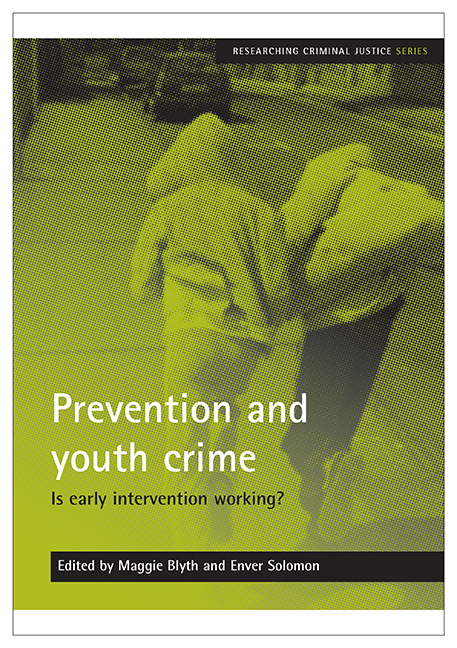Book contents
- Frontmatter
- Contents
- Foreword
- Acknowledgements
- List of abbreviations
- Notes on contributors
- Introduction
- 1 Integrated or targeted youth support services: an essay on ‘prevention’
- 2 Intervening in gang-affected neighbourhoods
- 3 Family intervention projects and the efficacy of parenting interventions
- 4 Early intervention and prevention: lessons from the Sure Start programme
- 5 Attachment research and the origins of violence: a story of damaged brains and damaged minds
- 6 Early intervention in the youth justice sphere: a knowledge-based critique
- 7 European perspectives on prevention
- Conclusion
3 - Family intervention projects and the efficacy of parenting interventions
Published online by Cambridge University Press: 25 March 2023
- Frontmatter
- Contents
- Foreword
- Acknowledgements
- List of abbreviations
- Notes on contributors
- Introduction
- 1 Integrated or targeted youth support services: an essay on ‘prevention’
- 2 Intervening in gang-affected neighbourhoods
- 3 Family intervention projects and the efficacy of parenting interventions
- 4 Early intervention and prevention: lessons from the Sure Start programme
- 5 Attachment research and the origins of violence: a story of damaged brains and damaged minds
- 6 Early intervention in the youth justice sphere: a knowledge-based critique
- 7 European perspectives on prevention
- Conclusion
Summary
Introduction
Over recent years it has been apparent that New Labour's anti-social behaviour agenda has changed in focus and emphasis, with increasing attention being paid to control measures involving ‘whole family’ approaches and parenting interventions. Family intervention projects (FIPs), first pioneered by the Dundee Families Project in the mid-1990s and subsequently developed by a small number of English local authorities in 2003-04, now have a central role in the government agenda to foster a ‘new approach to the most challenging families’ (Home Office, 2006a; Cabinet Office, 2008). In 2006, the establishment of a network of 50 FIPs formed a core part of the Respect action plan (Home Office, 2006a), while, more recently, cross-government commitment to this model of working is evidenced in a number of policy initiatives including the Social Exclusion Task Force review of ‘families at risk’ and the recently published Youth taskforce action plan from the Department for Children, Schools and Families (DCSF, 2008) with the roll-out of intensive intervention projects targeting young people.
As the number and type of FIPs have grown, a recurring theme evident in FIP working practices is the need to reduce the impacts of parental problems on children's life chances, with measures to improve parenting skills frequently forming a core element of FIP practices (Dillane et al, 2001; Jones et al, 2005; Nixon et al, 2006a, 2006b). This focus on ‘parenting deficit’ is symbolic of a significant expansion of state intervention into family life and signals a renewed emphasis on the domestic sphere as the site for policy interventions (Lister, 2006). Whether family-based interventions are to be welcomed as a means of facilitating new possibilities for genuinely positive practice or whether they are more correctly located as a component of an increasingly interventionist and punitive youth justice model is open to question (Goldson and Jamieson, 2002; Holt, 2008; Parr, 2008; Parr and Nixon, 2008).
This chapter seeks to contribute to the debate about the benefits and drawbacks of increased state intervention in family life through an examination of the lived material realities of FIP practices viewed through the lens of parents’ (usually mothers’) experiences. It will draw on rich qualitative data collected as part of three evaluative research studies of FIPs involving eight separate projects (Nixon et al, 2006a, 2006b; Parr, 2007; Nixon and Parr, 2008; Parr et al, 2008).
- Type
- Chapter
- Information
- Prevention and Youth CrimeIs Early Intervention Working?, pp. 41 - 52Publisher: Bristol University PressPrint publication year: 2008



